Eccentrics
Odd Bicycles
Posted By: Paul - Mon Jul 18, 2016 -
Comments (1)
Category: Bicycles and Other Human-powered Vehicles, Eccentrics, Inventions, 1930s
Rev. irwin Moon, Science Preacher
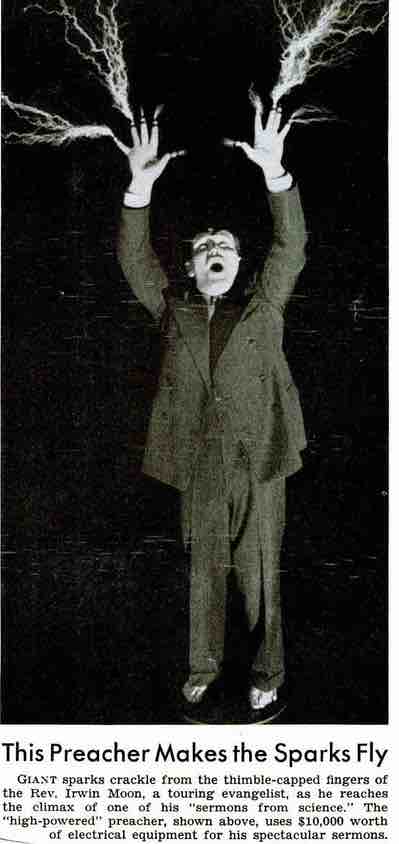
Obituary here.
Posted By: Paul - Fri Jul 15, 2016 -
Comments (0)
Category: Eccentrics, Religion, Science, 1930s
Tom Leppard, RIP
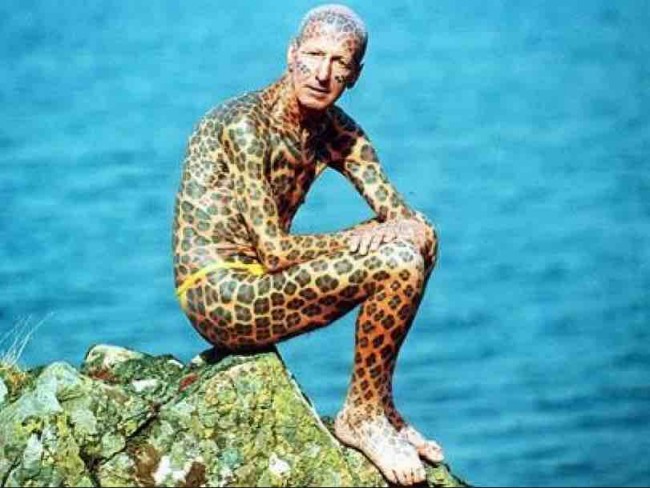
Obituary here.
Posted By: Paul - Thu Jun 16, 2016 -
Comments (2)
Category: Body Modifications, Eccentrics, Europe
Court rules sun uninhabitable
Godfried Bueren of Germany declared that there were areas on the sun cool enough to support human life. He offered 25,000 marks to anyone who could prove him wrong. So the Hamburg Astronomical Society sent him a list of reasons why he was wrong. When Bueren refused to pay, the society took him to court. In 1953, the court ordered him to pay up.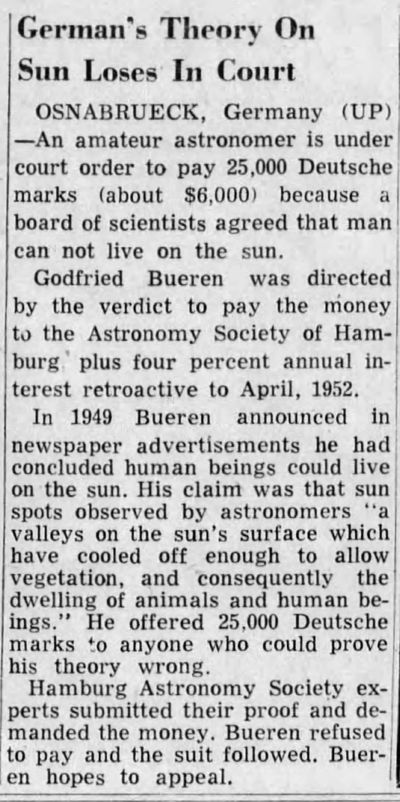
Palm Beach Post - Mar 22, 1953
More info in Time - Feb 23, 1953:
Through years of spare-time dabbling in such occult sciences as prophecy and mental telepathy, Godfried Bueren, 70, a West German patent attorney, never lost his amateur enthusiasm for astronomy. Finally, he announced, he had learned something that professional astronomers don't know. The sun, asserted Herr Bueren is a hot, hollow sphere, a million miles in diameter; inside its fiery shell floats a cool core, 600,000 miles thick and lush with vegetation. What's more, he had 25,000 marks ($5,945) that said he was correct about the sun.
When Herr Bueren announced his startling theory, most scientists shrugged it off. But the German Astronomical Society accepted the challenge. Said Hamburg Observatory Director Otto Heckmann: the society would like to keep such "silly ideas" from attracting too much attention. Besides, the society needed the money.
Like schoolmasters marking a poor student's test paper Dr. Heckmann and a couple of scientists sharpened their pencils and set to work on Herr Bueren's theory. The sun's corona does blaze at approximately 1,000,000° C., they conceded, but who can believe that the enormous heat is caused, as Herr Bueren also insisted, by cosmic particles striking the sun's outer atmosphere? Why shouldn't the same particles bombard the earth and set it glowing? And did Herr Bueren really believe that sunspots are gaping holes in the sun's shell, opening on to a cool black core where plant life changes heat into chemical energy, thus lowering the temperature? Pure nonsense, said the scientists. As for heat-reducing plants: Dr. Heckmann & Co. pointed out that science knows of no plants that use up all the energy available to them.
A Bueren-picked jury of West German scientists studied the astronomical society's arguments and solemnly announced the the Bueren solar theory had been demolished. His bald pate flushed with anger, the sun-gazing patent attorney refused to pay. "People who want to cash in on the money," he cried, "do not even pay attention to what I have to say."
But Dr. Heckmann and colleagues, having paid attention to the prize offer, sued Bueren in the Osnabruck court. "Science cannot always say what is correct." they argued, "but we have advanced so far as to be able to say what is wrong."
Last week, despite Herr Bueren's dark mutterings that his professorial jury had been intimidated, the court found the sun's core legally hot, ordered him to hand over the 25,000 marks plus a year's interest at 4% and court costs.
Posted By: Alex - Tue Jun 14, 2016 -
Comments (6)
Category: Eccentrics, Science, 1950s
That Sly Old Gentleman from Featherbed Lane
Charming song about elderly neighborhood Peeping Tom.
Posted By: Paul - Sun May 22, 2016 -
Comments (1)
Category: Eccentrics, Myths and Fairytales, 1930s
Ariffin Mohamad and His Sky Kingdom
Let us now mourn the death of Arrifin Mohamad, founder of the Sky Kingdom cult, which seems to have been inspired by Disneyland.
Posted By: Paul - Tue Apr 26, 2016 -
Comments (2)
Category: Cult Figures and Artifacts, Eccentrics, Religion, Asia
The Electric Pencil
Sounds pretty much like prime fodder for WU-vies.
"Around the year 1910, a patient at State Lunatic Asylum No. 3 in Nevada, Missouri, who referred to himself as The Electric Pencil, executed 280 drawings in ink, pencil, crayon and colored pencil. These beautiful drawings of animals, people and buildings were executed on both sides of 140 ledger pages, each bearing the name of the hospital in official type across the top, thus dramatizing the interface of the institutional and the creative. The Electric Pencil's drawings were sewn into a handmade album of fabric and leather, which shortly afterwards was lost--for a century."
Posted By: Paul - Tue Mar 29, 2016 -
Comments (5)
Category: Cult Figures and Artifacts, Eccentrics, Books, Twentieth Century, Mental Health and Insanity
Tom Haywood’s Self-Kicking Machine
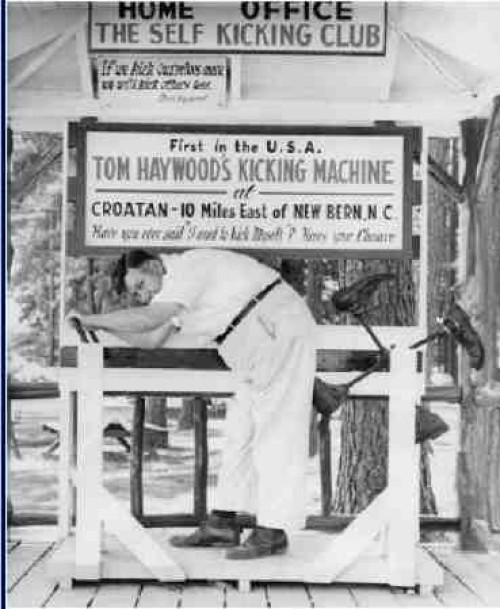
Look at the sorry state of this fine invention nowadays.
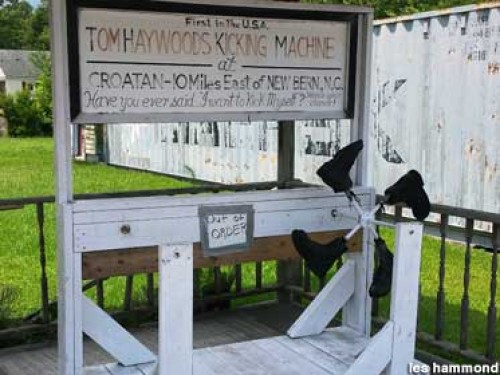
Posted By: Paul - Fri Mar 11, 2016 -
Comments (8)
Category: Eccentrics, Humor, Inventions, Regionalism, 1950s
From Cretin to Genius
In the 1920s, Doctor Serge Voronoff famously decided that grafting monkey glands onto the testicles of human males would rejuvenate the recipients. His ludicrous failed experiments provided the punchlines for innumerable jokes thereafter.But what I did not realize was that twenty years later, Voronoff was still at it. Now he claimed, in his book FROM CRETIN TO GENIUS, that transplanting monkey glands would alter the intelligence of the subjects. Below is the start of a review from 1943.
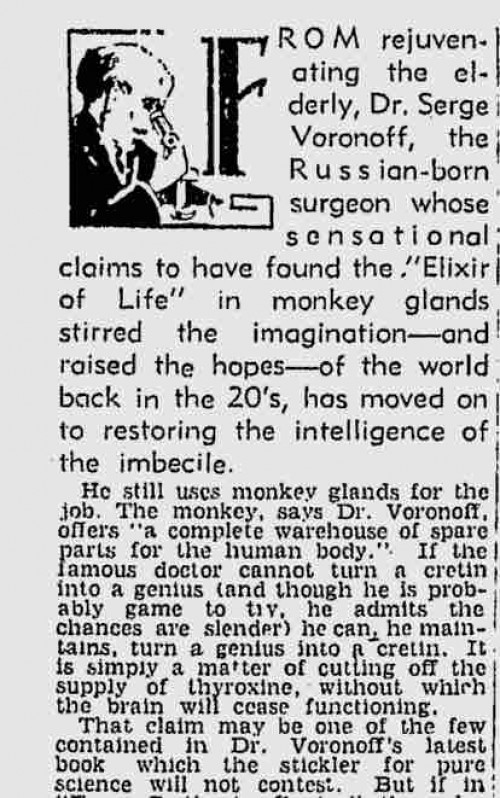
Below: the Doc and Missus.
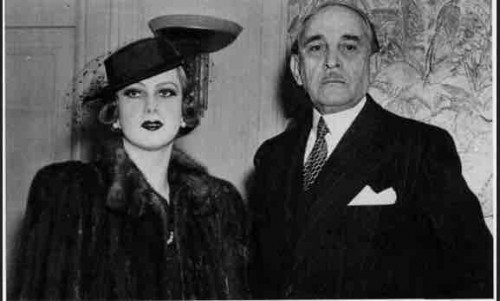
Posted By: Paul - Mon Feb 15, 2016 -
Comments (7)
Category: Animals, Eccentrics, Mad Scientists, Evil Geniuses, Insane Villains, Sexuality, 1920s, 1940s, Genitals
Two Weird People Find Each Other
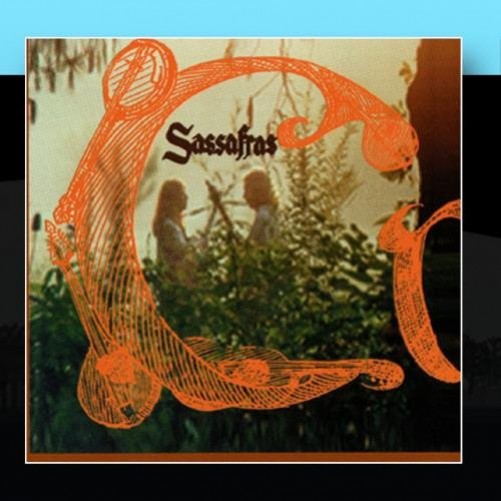
I cannot embed the song that goes with this title, but you should be able to listen it in its entirety at this site. Rather pleasant Fairport Convention-style music with odd lyrics. Seems like a potential theme song for WU.
Alternately, you can hear a snippet at the Amazon link.
Posted By: Paul - Fri Feb 05, 2016 -
Comments (1)
Category: Eccentrics, Love and Romance, Music

| Who We Are |
|---|
| Alex Boese Alex is the creator and curator of the Museum of Hoaxes. He's also the author of various weird, non-fiction, science-themed books such as Elephants on Acid and Psychedelic Apes. Paul Di Filippo Paul has been paid to put weird ideas into fictional form for over thirty years, in his career as a noted science fiction writer. He has recently begun blogging on many curious topics with three fellow writers at The Inferior 4+1. Contact Us |




